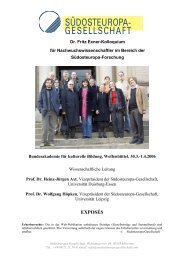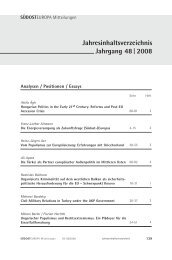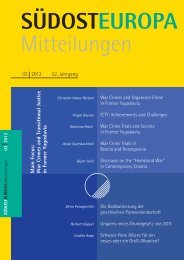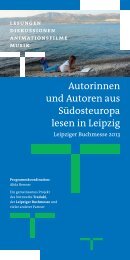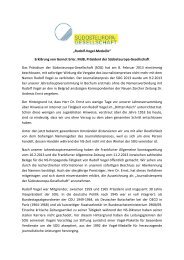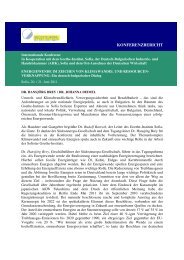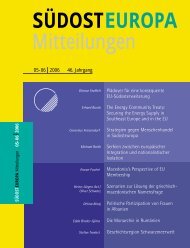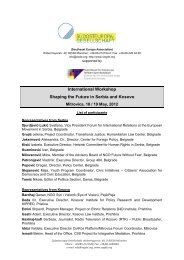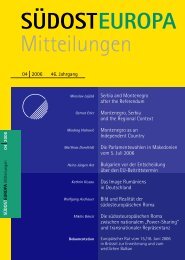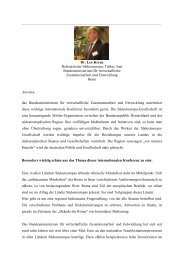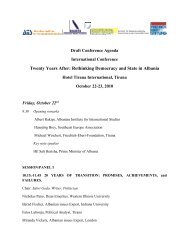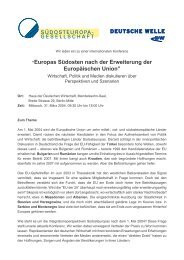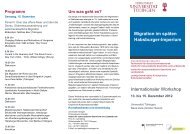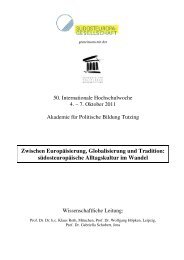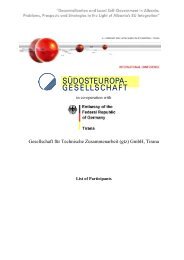SÃDOST EUROPA Mitteilungen - Suedosteuropa Gesellschaft
SÃDOST EUROPA Mitteilungen - Suedosteuropa Gesellschaft
SÃDOST EUROPA Mitteilungen - Suedosteuropa Gesellschaft
You also want an ePaper? Increase the reach of your titles
YUMPU automatically turns print PDFs into web optimized ePapers that Google loves.
SÜDOST <strong>EUROPA</strong><br />
<strong>Mitteilungen</strong><br />
04-05 2010 50. Jahrgang<br />
Wolfgang Ischinger / Oliver Rolofs<br />
Gunda Schumann<br />
Kosovo und Serbien: Möglichkeiten<br />
für einen Modus vivendi?<br />
Visa Liberalisation for Citizens of Kosovo?<br />
SÜDOST<strong>EUROPA</strong> <strong>Mitteilungen</strong> 04-05 2010<br />
Schwerpunkt<br />
Ungarn & Slowakei<br />
Norbert Spannenberger<br />
Wolfgang Aschauer<br />
Karl-Peter Schwarz<br />
Barbora Moormann-Kimáková<br />
Zdenek Lukas<br />
Ungarn nach den Parlamentswahlen<br />
im April 2010<br />
Probleme im ungarisch-slowakischen<br />
Verhältnis<br />
Anti-Revisionismus und Anti-Magyarismus<br />
an der Donau<br />
Parlamentswahlen 2010 –<br />
Rechtsruck in der Slowakei?<br />
Die slowakische Wirtschaft im Licht<br />
der Wirtschafts- und Finanzkrise<br />
Ognian Hishow<br />
Holm Sundhaussen<br />
Öffentliche Schuld in den<br />
EU-Mitgliedstaaten Südosteuropas<br />
Die Geschichte Südosteuropas neu denken!
Inhalt<br />
04-05 2010 50. Jahrgang<br />
Analysen / Positionen / Essays<br />
6 Wolfgang Ischinger / Oliver Rolofs<br />
Kosovo und Serbien: Möglichkeiten für einen Modus vivendi?<br />
20 Gunda Schumann<br />
Visa Liberalisation for Citizens of Kosovo – A Critical Analysis of the<br />
Current State of Play and Future Perspectives<br />
Schwerpunkt Ungarn & Slowakei<br />
38 Norbert Spannenberger<br />
Ungarn nach den Parlamentswahlen im April 2010:<br />
Mehr als nur ein Rechtsruck<br />
52 Wolfgang Aschauer<br />
Aktuelle Probleme im ungarisch-slowakischen Verhältnis aus<br />
diskurstheoretischer Sicht<br />
70 Karl-Peter Schwarz<br />
Anti-Revisionismus und Anti-Magyarismus an der Donau –<br />
Über die schwierige Nachbarschaft von Ungarn und Slowaken<br />
82 Barbora Moormann-Kimáková<br />
Parlamentswahlen 2010 – Ein Rechtsruck in der Slowakei?<br />
92 Zdenek Lukas<br />
Die slowakische Wirtschaft im Licht der globalen Finanz- und<br />
Wirtschaftskrise – Ein Vergleich mit den anderen neuen EU-Staaten<br />
in Mitteleuropa
04-05 2010<br />
100 Ognian Hishow<br />
Die explizite und implizite öffentliche Schuld in den südosteuropäischen<br />
EU-Mitgliedstaaten<br />
118 Holm Sundhaussen<br />
Die Geschichte Südosteuropas neu denken!<br />
133 Forum<br />
Berichte<br />
135 Der westliche Balkan zwischen Marginalisierung und EU-Integration –<br />
Historische, kulturelle und politische Perspektiven. Berlin, Mai bis Juli 2010<br />
139 Identitäten und Imaginationen der Bevölkerung in Grenzräumen –<br />
Ostmittel- und Südosteuropa im Spannungsfeld von Regionalismus,<br />
Zentralismus, europäischem Integrationsprozess und Globalisierung.<br />
Bukarest, 1.-3. Juli 2010<br />
143 10. Jubiläum Theaterbiennale – Neue Stücke aus Europa. Wiesbaden /<br />
Mainz, 17.-27. Juni 2010<br />
145 10. goEast-Festival des mittel- und osteuropäischen Films. Wiesbaden,<br />
21.-27. April 2010<br />
147 Rezensionen<br />
F. Štiblar: The Impact of the Global Crisis on Montenegro and the Western Balkans<br />
F. Štiblar: The Balkan Conflict & Its Solutions C. Smigiel (Ed.): Gated and<br />
Guarded Housing in Eastern Europe D. Göler (Ed.): Regional Studies in South<br />
Eastern Europe – Spatial development in Bosnia and Herzegovina in a comparative
04-05 2010<br />
perspective T. Gromes: Demokratisierung nach Bürgerkriegen – Das Beispiel<br />
Bosnien und Herzegowina S. Ferhadbegović: Prekäre Integration – Serbisches<br />
Staatsmodell und regionale Selbstverwaltung in Sarajevo und Zagreb 1918-1929<br />
T. Sojčić: Die „Lösung“ der kroatischen Frage zwischen 1939-1945 – Kalküle und<br />
Illusionen U. Schiller: Deutschland und „seine“ Kroaten – Vom Ustaša-Faschismus<br />
zu Tudjmans Nationalismus P. U. Weiß: Kulturarbeit als diplomatischer Zankapfel –<br />
Die kulturellen Auslandsbeziehungen im Dreiecksverhältnis der beiden deutschen<br />
Staaten und Rumäniens von 1950 bis 1972 P. Motzan / S. Sienerth (Hrsg.):<br />
Wahrnehmung der deutsch(sprachig)en Literatur aus Ostmittel- und Südosteuropa –<br />
ein Paradigmenwechsel? M. Jakiša: Bosnientexte – Ivo Andrić, Meša Selimović,<br />
Dževad Karahasan M. Stanić: Dalmatien – Kleine Kunstgeschichte einer europäischen<br />
Städtelandschaft N. Mišković: Basare und Boulevards – Belgrad im<br />
19. Jahrhundert M. Dogo / A. Pitassio (Hrsg.): Cittá dei Balcani, cittá d`Europa –<br />
Studi sullo sviluppo urbano delle capitali post-ottomane 1830-1923 G. Ortalli /<br />
O. J. Schmitt (Hrsg.): Balcani Occidentali, Adriatico e Venezia fra XIII e XVIII Secolo /<br />
Der westliche Balkan, der Adriaraum und Venedig (13.-18. Jh.) H. C. Löhr: Die<br />
Gründung Albaniens – Wilhelm zu Wied und die Balkan-Diplomatie der Großmächte<br />
1912-1914 W. Oschlies: Mutter Teresa – Die Jugend in Skopje
Editorial<br />
Sehr geehrte Leserin, sehr geehrter Leser,<br />
am 22. Juli 2010 stellte der Internationale Gerichtshof in Den Haag in einem mit Spannung<br />
erwarteten Rechtsgutachten fest, die Unabhängigkeitserklärung des Kosovo vom 17. Februar<br />
2008 habe nicht allgemeines internationales Recht verletzt. Mitte September 2010 schloss<br />
sich – auf massiven Druck der EU – die politische Führung in Belgrad einer Resolution der<br />
Vereinten Nationen an, die Serbien und Kosovo zum Dialog über „alle offenen Fragen“ auffordert.<br />
Wolfgang Ischinger, 2007 Vertreter der EU bei den so genannten „Troika-Verhandlungen“<br />
über den Status des Kosovo, äußert in seinem gemeinsam mit Oliver Rolofs verfassten Beitrag<br />
die Hoffnung, „dass nun doch ein Schlussstrich unter den drei Jahrzehnte schwelenden Kosovo-<br />
Konflikt gezogen werden kann“. Die Autoren sehen in Kosovo nichts weniger als den „Testfall<br />
für die Führungskraft Europas“, denn der EU fehle weiterhin eine kohärente und glaubwürdige<br />
Strategie für Kosovo und den westlichen Balkan insgesamt. Zu der von den Autoren geforderten<br />
Strategie gehört auch, dass Kosovo schnellstmöglich in die Politik der Schengen-Visaliberalisierung<br />
einbezogen wird – darin sind sich Ischinger und Rolofs einig mit der Autorin<br />
Gunda Schumann, bis vor kurzem Mitarbeiterin der EULEX.<br />
Auch eine EU-Mitgliedschaft aber bedeutet keine Garantie für gute nachbarschaftliche<br />
Beziehungen – dies zeigt das Beispiel von Ungarn und der Slowakei, denen sich der Schwerpunkt<br />
in diesem Doppelheft der Südosteuropa <strong>Mitteilungen</strong> widmet. Unsere Autoren werfen<br />
Schlaglichter auf die historischen Hintergründe der schwierigen Nachbarschaft, auf die<br />
antagonistischen Auffassungen zur Rolle von Staat und Nation, auf die Ergebnisse der jeweiligen<br />
Parlamentswahlen 2010 und deren Hintergründe sowie auf die Auswirkungen der globalen<br />
Finanz- und Wirtschaftskrise in beiden Staaten. Der FAZ-Korrespondent Karl-Peter Schwarz<br />
sieht zumindest eine „beruhigende Wirkung“, die von der EU-Mitgliedschaft ausgehe: „So<br />
scharf die Töne auch waren, die aus Pressburg und Budapest zu vernehmen waren – beide<br />
Staaten haben die Grenzen nicht überschritten, die die europäische Integration nationalstaatlichen<br />
Konflikten gezogen hat.“<br />
Nichts weniger als eine neue Geschichtsbetrachtung, einen „Schlussstrich unter die Vergangenheit“,<br />
fordert der Historiker Holm Sundhaussen in seinem Beitrag „Die Geschichte<br />
Südosteuropas neu denken!“. Sundhaussens grundlegender Beitrag sei nicht nur allen historisch<br />
Interessierten zur Lektüre empfohlen.<br />
Ihr Redaktionsteam<br />
Hansjörg Brey<br />
Claudia Hopf
SÜDOST<strong>EUROPA</strong><br />
<strong>Mitteilungen</strong><br />
Zeitschrift der Südosteuropa-<strong>Gesellschaft</strong><br />
Summaries Heft 04-05/2010<br />
50. Jahrgang<br />
Wolfgang Ischinger / Oliver Rolofs<br />
Kosovo and Serbia: Options for a Modus Vivendi?<br />
On 22 July 2010, the International Court of Justice (ICJ) reaffirmed the view that the<br />
Republic of Kosovo is, and will remain, an independent state. The advisory opinion<br />
and the last UN resolution of the General Assembly on Kosovo of September 2010<br />
– eleven years after the intervention of NATO – is hopefully going to usher in a<br />
modus vivendi for both Belgrade and Pristina.<br />
The key elements needed to settle the dispute had already been developed by the<br />
Kosovo troika in 2007 using Ahtisaari’s proposals as a guideline. Now they have to<br />
be implemented. To get the dialogue between Belgrade and Pristina going, several<br />
elements are important: The EU needs to live up to their responsibility of supporting<br />
peace and stability in the entire region. For Serbia it is time to look ahead. From a<br />
political and economic point of view it is overdue that relations between Kosovo and<br />
Serbia return to normal.<br />
For a productive dialogue between Belgrade and Pristina, the article discusses six<br />
approaches to resolve the bilateral dispute and the EU’s current dilemma of not being<br />
able to take decisions or lead due to internal dissent. The EU should assume a clear<br />
leadership role and develop perspectives for the region, and Belgrade and Pristina<br />
must find a modus vivendi with each other as they aspire to join the EU.<br />
Gunda Schumann<br />
Visa Liberalisation for Citizens of Kosovo – A Critical Analysis of<br />
the Current State of Play and Future Perspectives<br />
The Thessaloniki Agenda, offering Western Balkan countries a future perspective in<br />
the European Union, has become tangible at last: Citizens of FYR Macedonia,<br />
Montenegro and Serbia may travel to the Schengen zone without visa, while Albania<br />
and Bosnia & Herzegovina will follow suit soon.<br />
However, one territory in the Western Balkans has been left out in the cold: Kosovo.<br />
It has neither become a partner of any “visa dialogue”, nor are its citizens entitled to<br />
receive Serbian biometric passports. The former Yugoslav province, facing<br />
incomplete recognition as an independent state due to its sui generis status, is<br />
caught between a rock and a hard place: Currently, it will have to rely on its own<br />
momentum for tackling reforms required to obtain visa liberalisation, however, without<br />
tangible incentives.<br />
As to the author, what Kosovo needs instead is a “structured approach” that would<br />
enable the public to compare progress between countries and civil society to put
2<br />
pressure on the government in order to avert the risk of becoming a failing state<br />
eventually. To keep visa liberalisation from backfiring on EU member states, an<br />
integrated approach combining both visa liberalisation and socio-economic<br />
development is urgently needed.<br />
Norbert Spannenberger<br />
Hungary after Parliamentary Elections in April 2010: More than a<br />
Shift to the Right<br />
The article inquires in how far the elections in Hungary in spring 2010 actually should<br />
be evaluated as decisive turning point since the political changes in 1989/1990.<br />
Contrary to earlier parliamentary elections, basic changes concerning the parties’<br />
political spectrum happened. These changes are by no way of meteoric nature, since<br />
the sole leadership of the ruling party FIDESZ represents a real option that goes<br />
beyond this election period. FIDESZ’s victory, which secures a comfortable 2/3<br />
majority, is not the result of an overwhelming election campaign, but is due to the<br />
self-destructive behavior of the Socialists and the left-wing Liberals, whose scandals<br />
and corruption incidents were a rewarding subject for the press.<br />
The opposition parties in Hungary have been dramatically weakened, not so much by<br />
the election results, but by other immanent reasons. Thus the government’s main<br />
focus lies in the fight against the right-wing extremist party Jobbik, which recently<br />
appeared on the political scenery. It is obvious that the second Orbán government<br />
seizes its chance to make those plans a success that didn’t show any results so far –<br />
such as the granting of a dual citizenship for Hungarian minorities abroad.<br />
Wolfgang Aschauer<br />
Current Problems as for Hungarian-Slovak Relations from a<br />
Discourse Theoretical View<br />
The paper deals with current controversies between Slovakia and Hungary from a<br />
discourse-theoretical point of view. It argues that controversies like those about the<br />
Hungarian law on dual citizenship, and many more, result from antagonistic<br />
discourses about the role of state and (ethnic) nation.<br />
While the Hungarian discourse stresses the ethnic nation’s priority over state<br />
interests and therefore claims the Hungarian state’s responsibility for the ethnic<br />
Hungarians abroad, the Slovak discourse stresses the state’s priority over ethnonational<br />
interests and therefore tries to reduce any influence of Hungarian nationals<br />
and their kin state in Slovakia.<br />
The article concludes that without overcoming these discourses, real solutions to the<br />
political controversies are quite improbable.<br />
Karl-Peter Schwarz<br />
Anti-Revisionism and Anti-Magyarism on the Danube<br />
About the Difficult Relations of Hungarians and Slovaks<br />
The bilateral relations between Hungary and Slovakia had registered a sudden<br />
deterioration just a year before new parliaments were elected in both countries in
3<br />
April and June 2010. A restrictive legislation regulating the use of the state language<br />
in Slovakia and a new Hungarian law offering citizenship to Magyar minorities in the<br />
neighbouring countries led to a hitherto unseen escalation in a controversy between<br />
the two member states of the European Union. Nationalists on both sides succeeded<br />
in reducing the complexity of a neighbourhood in the very heart of Europe to simple<br />
ethno-political patterns. The new government in Slovakia which got parliamentarian<br />
support in August 2010 tries to mitigate the conflict. – The article resumes the<br />
development of the recent crisis and describes its historical background.<br />
Barbora Moormann-Kimáková<br />
Parliamentary Election 2010 – A Shift to the Right in Slovakia?<br />
The results of the recent parliamentary elections in the Czech Republic, Hungary and<br />
Slovakia are often referred to as a “right shift” – meaning the success of far right<br />
parties on the one hand or the success of center-right parties on the other. A<br />
differentiated analysis of “left” and “right” in Slovakia, distinguishing between an<br />
economic, value and nation-orientation level as well as cleavages not overlapping<br />
with the “left-right” continuum, shows a complicated pattern which does not allow for<br />
a one-dimensional evaluation of the results.<br />
The election in Slovakia in June 2010 marked a historical victory of a social<br />
democratic party, which however is relativized by its nationalist rhetoric in the past<br />
years as well as cooperation with nationalists and Vladimir Meciar in the past<br />
government. The losses of Meciar, nationalists, as well as the more radical of<br />
Hungarian parties seem to mark the end of “Meciarism” in Slovakia and a shift away<br />
from far right.<br />
A shift to the right on the economic level seems obvious, but the old Christian<br />
democrat parties in fact experienced losses or only minor gains. Two new parties on<br />
the other hand, a liberal one and a party seeking to overcome the ethnic cleavage in<br />
Slovakia, surprised with high gains. The future of the new government remains<br />
unclear, as it has to face the financial crisis as well as the rising poll numbers of<br />
social democrats.<br />
Zdenek Lukas<br />
The Slovak Economy in the Light of Global Financial and Economic<br />
Crisis<br />
A Comparison with Other New EU Countries in Central Europe<br />
Slovakia’s banking sector was not directly affected by the global financial and<br />
economic crisis as banks’ exposure to highly toxic assets was marginal. In addition,<br />
at the beginning of the turbulent year 2009, Slovakia adopted the euro: This definitely<br />
eased the impact of the financial crisis on Slovak banking.<br />
However, the strongly export-oriented Slovak economy was hit hard by the sharp<br />
contraction of foreign demand in 2009. The GDP was down, the labour market<br />
deteriorated and the general government deficit was rising. But, with surprising<br />
strength and earlier than expected, the Slovak economy has been recovering with<br />
the highest growth in the EU. The GDP was up by 4.8 % in the first quarter of 2010.<br />
The economic expansion has been largely the result of the revival in external<br />
demand, supported by improved competitiveness. As for sustainable economic
4<br />
growth in the future, the crucial point is to avoid any measures that would threaten<br />
Slovakia’s regained competitiveness and might thus undermine its competitive<br />
position particularly within the EU. If the euro remains weak, unit labour costs<br />
continue to be low and if the economies of Slovakia’s main trading partners are<br />
strongly recovering, GDP growth may remain high. However, economic growth driven<br />
by a massive appetite for consumption will not return to the high rates seen a few<br />
years ago. The main challenges for the new Slovak centre-right government relate to<br />
rising unemployment and an escalating budget deficit.<br />
Ognian Hishow<br />
Explicit and Implicit Public Debt in the Southeast European EU<br />
Member States<br />
Excessive borrowing during the global economic crisis caused public debt to soar in<br />
many Southeast European member states of the EU. The result is that not only<br />
Greece is facing a fiscal squeeze but also do Hungary, Cyprus and others.<br />
Moreover, on top of this – explicit – public debt there are so-called implicit liabilities.<br />
They are related to the promise of the government to pay pensions, offer medical<br />
treatment to the insured, and to provide long-term care to the elderly.<br />
The implicit liabilities that governments bear are in the vicinity of 500 per cent of the<br />
GDP in Greece, Slovenia, or Cyprus. Given the demographic trend they may –<br />
without immediate countermeasures – rise further.<br />
In the article, a standard model is employed to evaluate the effects of selected<br />
policies aimed at dealing with the burgeoning explicit and implicit debt in the<br />
countries considered.<br />
Holm Sundhaussen<br />
A New Approach to the Historiography of Southeast Europe<br />
Following a short outline of the main approaches, semantics and limits of national<br />
historiography in Southeast Europe / the Balkans, the article focuses on some<br />
phenomena which do not fit in with the history of a state or the history and<br />
“prehistory” of a nation.<br />
This is especially true for many of the migrations in pre-modern times. Crossing the<br />
borders of states and cultures (often accompanied by an identity switch) was an<br />
important aspect of everyday life. Besides the history of states and (modern) nations,<br />
the history of migrations (beyond states and nations) should therefore figure as a<br />
third pillar of Southeast European historiography.<br />
One of the main challenges of such an approach concerns the identification of ethnic<br />
groups. Many of the recorded ethnonyms do not necessarily correspond to an ethnic<br />
group (in the sense of a group with common descent). In many cases it remains<br />
unclear what is behind a name. The same ethnonym was often applied to people of<br />
different origin who were only united by their profession, language or religion. In most<br />
cases the ethnic origins of modern nations and the ethnic continuity of pre-modern<br />
ethnic groups is a matter of pure speculation.<br />
The article stresses the contingent and performative character of ethnic and national<br />
identity and argues in favour of a historiography which questions the popular<br />
perceptions of autochtonity and continuity of groups.



